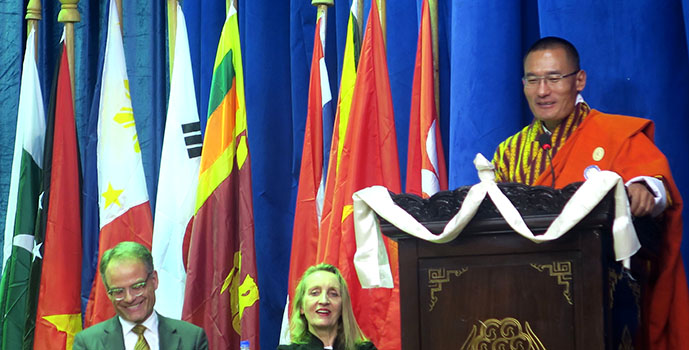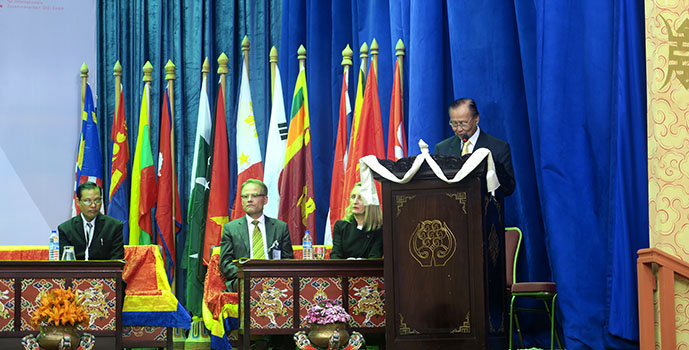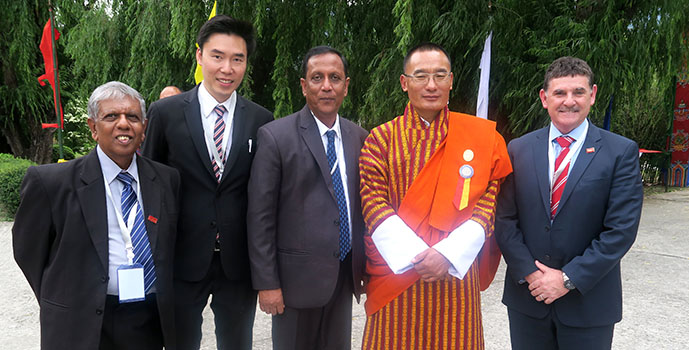- About Us
-
Who we are
-
- Publications
-
- ADPC Academy
-
MediaADPC'S NEWS
The 12th RCC meeting opened by the Prime Minister of Bhutan The 12th RCC meeting opened by the Prime Minister of Bhutan
17 Jun 2015
Thimphu, Bhutan
The 12th meeting of the Regional Consultative Committee on Disaster Management (RCC) was opened yesterday by the Prime Minister of Bhutan H.E. Lyonchhen Tshering Tobgay at the Convention Centre in Thimphu. Hosted by the Ministry of Home and Cultural Affairs of Bhutan together with ADPC, the meeting is a gathering of 15 countries to discuss risk-sensitive development and disaster risk reduction in Asia.
In his opening remarks, the Prime Minister of Bhutan emphasized on the important role platforms like the RCC play in better preparing the region for natural disasters such as the devastating earthquake in Nepal in April 2015.
Prime Minister of Bhutan H.E. Lyonchhen Tshering Tobgay delivering the inaugural speech a the 12th meeting of the Regional
Consultative Committee on Disaster Management in Thimphu, Bhutan.
Asian Disaster Preparedness Center’s Chairman Dr. Krasae Chanawongse gave his opening remarks along with Mr. Martin Hoppe, Head of Division at the Federal Ministry for Economic Cooperation and Development (BMZ) of Germany and Ms. Cornelia Richter, Managing Director of Deutsche Gesellschaft für Internationale Zusammenarbeit (GIZ) GmbH.
“The earthquake in Nepal is another clear indicator that we need to focus on the importance of reducing the impact of disasters. It will enable us to save more lives and minimize the damage caused to important infrastructure that could otherwise set back hard-earned development gains,” said Dr. Chanawongse.
"Disaster risk reduction will enable us to save more lives and minimize the damage caused to important infrastructure that could
otherwise set back hard-earned development gains,” said Dr. Krasae Chanawongse, Chairman of ADPC.
Adopting the SFDRR in Asia
The event is timely as the new Sendai Framework for Disaster Risk Reduction (SFDRR) was adopted at the 3rd UN World Conference on Disaster Risk Reduction in March 2015.
The framework will be guiding disaster risk reduction efforts globally during the next 15 years until 2030, and the Asian countries – representing the most disaster-prone region of world – will have a central role in achieving its objectives.
“In this meeting, we hope to lay down an actionable roadmap for the implementation of the recently adopted global agreement to achieve our common goal of safer communities and sustainable development through disaster risk reduction,” Dr. Chanawongse said.
The RCC member states agreed that the meeting should focus on finding ways to sustainably build on the achievements gained
during the implementation of the recently concluded Hyogo Framework for Action.
Synergizing the RCC meeting with other regional and global mechanisms on DRR
During the opening session, the RCC member states agreed that the meeting should focus on finding ways to sustainably build on the achievements gained during the implementation of the recently concluded Hyogo Framework for Action, and identify key priorities for the RCC member countries in the implementation of the new framework during the next five years.
The member states also agreed on the need for regional cooperation in operationalizing risk-sensitive development under the SFDRR and the importance of connecting the efforts with other global and regional frameworks, including the Sustainable Development Goals.
The member states also discussed RCC's contribution to the World Humanitarian Summit to be held in May 2016 in Turkey, and the RCC’s future cooperation with the Heart of Asia, a mechanism for regional cooperation in Central and West Asia.
The next two days of the meeting will focus on the need to mainstream disaster risk reduction and climate change adaptation into development, and the systematic integration of disaster risk reduction and climate change adaptation into public investment planning. The member states will also discuss the strengthening of early warning systems for disasters and the integration of gender approaches into post-disaster phases.
The meeting is supported by the German Government through GIZ.
The participants agreed on the need for regional cooperation in operationalizing risk-sensitive development under the Sendai
Framework for Disaster Risk Reduction.
From left to right: ADPC's Directors Mr. N.S.M.I Arambepola, Dr. Peeranan Towashiraporn and Mr. Sajedul Hasan,
Prime Minister of Bhutan H.E. Lyonchhen Tshering Tobgay, and ADPC's Executive Director Mr. Shane Wright.Latest NewsRelated Trainings
-